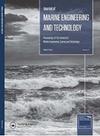一种面向对象的分布式弱电网船舶发电厂模拟器框架
IF 2.6
4区 工程技术
Q1 Engineering
Journal of Marine Engineering and Technology
Pub Date : 2022-09-12
DOI:10.1080/20464177.2022.2120171
引用次数: 0
摘要
摘要在这项工作中,我们讨论并演示了如何在分布式协同仿真框架中高效地建立和模拟具有弱电网的多引擎船用发电厂。为了便于在线启动和停止、连接和断开任意发电机组等配置切换,将发电机模型建模为混合因果分量模型。这种实现实现了无缝和节能的模型切换。此外,所提出的模拟器框架是可扩展的,使得发电厂中的发电机组数量可以由单个参数设置,从而相应地自动缩放功率管理系统和定制的模拟器主算法。为了在运行模拟时控制连接到电网的有功发电机组的数量,提出了一个简单的混合整数线性规划公式。最后进行了一个模拟案例研究,包括具有四个同等尺寸发电机组的海上发电厂配置,以展示所提出的模拟器框架的特点,该框架也可应用于小型风电场或具有互连发电机的孤立岛屿。本文章由计算机程序翻译,如有差异,请以英文原文为准。
A distributed object-oriented simulator framework for marine power plants with weak power grids
ABSTRACT In this work, we discuss and demonstrate how multi-engine marine power plants with weak power grids efficiently can be set up and simulated in a distributed co-simulation framework. To facilitate configuration switching such as starting and stopping, connecting and disconnecting arbitrary gensets online, the generator models are modelled as hybrid causality component models. This implementation enables seamless and energy conservative model switching. Also, the proposed simulator framework is scalable such that the number of gensets in the power plant can be set by a single parameter, which automatically scales the power management system and the tailored simulator master algorithm accordingly. To control the number of active gensets being connected to the power grid while running the simulation, a simple mixed integer linear programming formulation is proposed. A simulation case study including a marine power plant configuration with four equal-sized gensets is conducted in the end to demonstrate the features of the proposed simulator framework, which also can be applied to, e.g. a small wind farm, or an isolated number of islands with interconnected power generators.
求助全文
通过发布文献求助,成功后即可免费获取论文全文。
去求助
来源期刊

Journal of Marine Engineering and Technology
工程技术-工程:海洋
CiteScore
5.20
自引率
0.00%
发文量
0
审稿时长
>12 weeks
期刊介绍:
The Journal of Marine Engineering and Technology will publish papers concerned with scientific and theoretical research applied to all aspects of marine engineering and technology in addition to issues associated with the application of technology in the marine environment. The areas of interest will include:
• Fuel technology and Combustion
• Power and Propulsion Systems
• Noise and vibration
• Offshore and Underwater Technology
• Computing, IT and communication
• Pumping and Pipeline Engineering
• Safety and Environmental Assessment
• Electrical and Electronic Systems and Machines
• Vessel Manoeuvring and Stabilisation
• Tribology and Power Transmission
• Dynamic modelling, System Simulation and Control
• Heat Transfer, Energy Conversion and Use
• Renewable Energy and Sustainability
• Materials and Corrosion
• Heat Engine Development
• Green Shipping
• Hydrography
• Subsea Operations
• Cargo Handling and Containment
• Pollution Reduction
• Navigation
• Vessel Management
• Decommissioning
• Salvage Procedures
• Legislation
• Ship and floating structure design
• Robotics Salvage Procedures
• Structural Integrity Cargo Handling and Containment
• Marine resource and acquisition
• Risk Analysis Robotics
• Maintenance and Inspection Planning Vessel Management
• Marine security
• Risk Analysis
• Legislation
• Underwater Vehicles
• Plant and Equipment
• Structural Integrity
• Installation and Repair
• Plant and Equipment
• Maintenance and Inspection Planning.
 求助内容:
求助内容: 应助结果提醒方式:
应助结果提醒方式:


